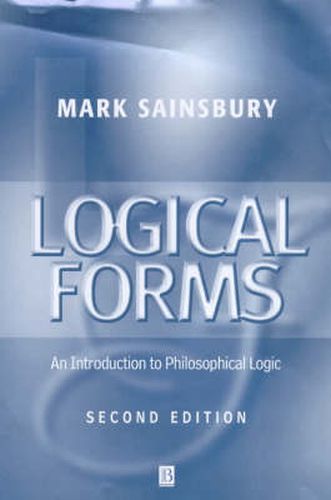Readings Newsletter
Become a Readings Member to make your shopping experience even easier.
Sign in or sign up for free!
You’re not far away from qualifying for FREE standard shipping within Australia
You’ve qualified for FREE standard shipping within Australia
The cart is loading…






When is a reason for doing or believing something a good reason? Over the past century, logic’s contribution to answering this question has typically involved finding logical forms : that is, using a special notation to bring out logical features more clearly. The correct identification of logical forms has been held to be important not only to logic but also to philosophy. Bertrand Russell coined the phrase philosophical logic to describe an approach to philosophical problems: find the correct logical form of the problematic sentences, and the problems vanish. Logical Forms explains both the theoretical underpinnings of the approach and the detailed problems involved in finding logical forms in the languages of propositional logic, classical first order logic, modal logic, and some alternatives such as free logic, binary and substitutional quantifiers. This revised edition incorporates results of recent work. Chapter 3 on conditionals, and the sections dealing with predicate quantifiers, free logics and subjunctive conditionals have been completely rewritten. The exercises are integrated throughout the book, and each chapter concludes with updated notes to guide further reading. The result is a genuinely interactive introduction which engages the reader in developing the argument. This book does not presuppose knowledge of deductive methods in formal logic and it will be of immense benefit to those approaching philosophical logic for the first time.
$9.00 standard shipping within Australia
FREE standard shipping within Australia for orders over $100.00
Express & International shipping calculated at checkout
When is a reason for doing or believing something a good reason? Over the past century, logic’s contribution to answering this question has typically involved finding logical forms : that is, using a special notation to bring out logical features more clearly. The correct identification of logical forms has been held to be important not only to logic but also to philosophy. Bertrand Russell coined the phrase philosophical logic to describe an approach to philosophical problems: find the correct logical form of the problematic sentences, and the problems vanish. Logical Forms explains both the theoretical underpinnings of the approach and the detailed problems involved in finding logical forms in the languages of propositional logic, classical first order logic, modal logic, and some alternatives such as free logic, binary and substitutional quantifiers. This revised edition incorporates results of recent work. Chapter 3 on conditionals, and the sections dealing with predicate quantifiers, free logics and subjunctive conditionals have been completely rewritten. The exercises are integrated throughout the book, and each chapter concludes with updated notes to guide further reading. The result is a genuinely interactive introduction which engages the reader in developing the argument. This book does not presuppose knowledge of deductive methods in formal logic and it will be of immense benefit to those approaching philosophical logic for the first time.